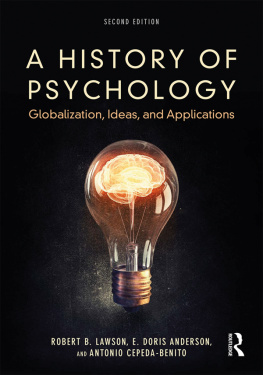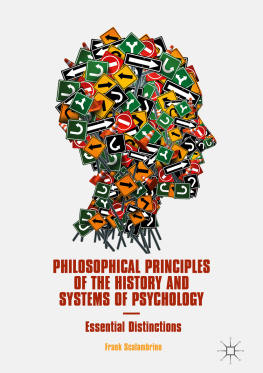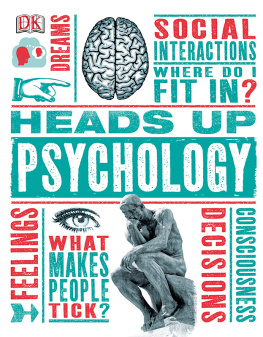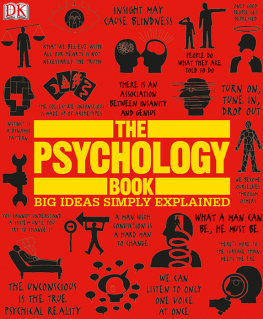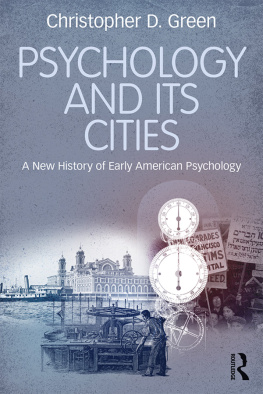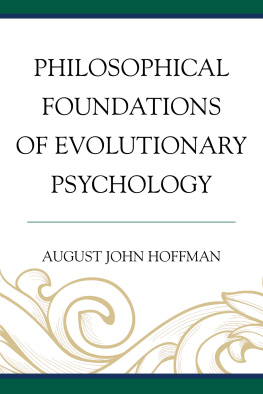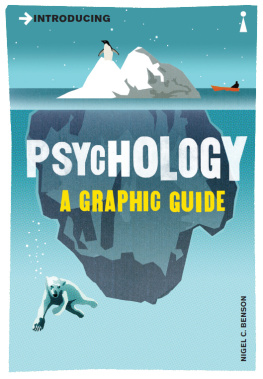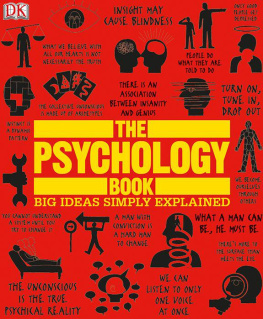Second edition published 2018
by Routledge
711 Third Avenue, New York, NY 10017
and by Routledge
2 Park Square, Milton Park, Abingdon, Oxon, OX14 4RN
Routledge is an imprint of the Taylor & Francis Group, an informa business
2018 Taylor & Francis
The right of Robert B. Lawson, E. Doris Anderson, and Antonio Cepeda-Benito to be identified as authors of this work has been asserted by them in accordance with sections 77 and 78 of the Copyright, Designs and Patents Act 1988.
All rights reserved. No part of this book may be reprinted or reproduced or utilised in any form or by any electronic, mechanical, or other means, now known or hereafter invented, including photocopying and recording, or in any information storage or retrieval system, without permission in writing from the publishers.
Trademark notice: Product or corporate names may be trademarks or registered trademarks, and are used only for identification and explanation without intent to infringe.
First edition published by Pearson Education, Inc. 2007
Library of Congress Cataloging-in-Publication Data
Names: Lawson, Robert B., author. | Anderson, E. Doris.,
author. | Cepeda-Benito, Antonio, author.
Title: A history of psychology : globalization, ideas, and applications / Robert B.
Lawson, E. Doris Anderson, and Antonio Cepeda-Benito.
Description: Second Edition. | New York : Routledge, 2018. | Revised edition of
A history of psychology, c2007. | Includes bibliographical references and indexes.
Identifiers: LCCN 2017025912 | ISBN 9780415788274 (hardback : alk. paper) |
ISBN 9781315225432 (ebook)
Subjects: LCSH: PsychologyHistoryTextbooks.
Classification: LCC BF81 .L39 2018 | DDC 150.9dc23
LC record available at https://lccn.loc.gov/2017025912
ISBN: 978-0-415-78827-4 (hbk)
ISBN: 978-1-315-22543-2 (ebk)
Typeset in Sabon
by Apex CoVantage, LLC
Section I
The Present
History is frequently dismissed as simply a record of past events, dry, stale, and inorganic, yet this is far from the truth as history is a living, reactive, and organic entity. Illuminating the past helps us to understand who we are now, while at the same time, our current understanding of reality in turn changes our view of past events. History also shapes the future. This is true of history in general as well as the more specific history of a scientific discipline such as psychology.
When you are trying to chart a course forward, it is essential to have points of reference that include where you are now as well as where you have been. Experiment and investigation without direction is not science, it is simply aimless curiosity. To engage fully as a scientist and/or practitioner in any scientific discipline, you need to understand the history of that discipline.
In this book, A History of Psychology: Globalization, Ideas, and Applications , we seek to provide the necessary points of reference that allow the reader to engage fully in the discipline of psychology. By understanding where psychology has been and the factors that have contributed to what psychology is today, the next generation of psychologists can more effectively plot the course for the future of the discipline.
Psychology has not developed in a vacuum, but rather has evolved within a larger cultural context. As a result, a history of psychology that is purely an internal history considering only developments within psychology, independent of cultural influence, is inadequate. Accordingly, although this book presents primarily an internal history, we take into account the broader intellectual and social context within which psychology has developed. This is particularly critical since this is one of the first textbooks on the history of psychology to go beyond American and Western European psychology.
The general framework of this book is designed to promote the view of psychology as a global enterprise, the development of which is moderated by the dynamic tension between the move toward globalization promoting homogeneity and concomitant local forces promoting diversity and indigenization.
In The Present: Globalization, Psychology, and History , we provide an overview of the concept of globalization and its impact on psychology, a treatment of psychology in America, and close with a discussion of the nature, methods, and purpose of history.
In Early Philosophical and Biological Foundations of Scientific Psychology , we present a general history of scientific psychology that focuses primarily on the Western intellectual traditions of the discipline.
In , we focus upon global issues addressed by each school of psychology, the leaders of each school, the defining ideas of each school, and the applications of those ideas in contemporary psychology.
Diversity in Psychology expands the scope of our discussion of the history of psychology beyond the Western and white male traditions of exclusion to include a systematic examination of the contributions of previously marginalized women and minority practitioners as well as the development of psychology outside of the Western cultural context.
Applied Psychology presents how the profession of Clinical Psychology emerged from the desire to demonstrate that psychology was a serious and useful science and societys need to find better ways to care for the mentally ill. The section ends with a brief overview of Forensic Psychology, and our views about the future of applied psychology.
Each chapter begins with an overview and a list of learning objectives to aid the reader in determining focal points in the material, and we conclude each chapter with a brief summary of the presented material. This book is intended primarily for an audience of undergraduate students in psychology who have already completed some introductory courses in the subject. The text is intended to be a challenging one that provokes discussion and deeper consideration of the forces influencing the development of psychology, and could also be appropriately used for a graduate-level course on the history of psychology. The book is intended for use as a stand-alone text for a one-semester course in the history of psychology that can be supplemented by focused readings selected by the instructor. Different configurations are possible for the use of the various sections of the text depending on the individual goals of the instructor; for example, a one-semester course using would emphasize the impact of globalization on psychology, the development of indigenous Western psychology, and the critical role of diversity in psychology around the globe. No matter how you use this text, we are confi-dent that you will appreciate fully that history has a future, and that for all of humanity to craft an enhanced future around the globe requires that we all think logically and act compassionately.
To aid them in appreciating the dynamic interaction between the development of psychology and the sociocultural context that surrounds it, we strongly recommend that students take the opportunity to engage in a Personal Timeline Exercise; preferably near the beginning of the course. To develop this timeline, we suggest that students examine their own history to determine what experiences, events, or people have shaped who they are as individuals and also as psychologists. This timeline should look beyond the personal sphere to include the individuals social and cultural context and is not necessarily limited to events following the students birth, since our lives are often significantly impacted by the lives and experiences of those who came before us. For example, a personal timeline could include items similar to the following:

